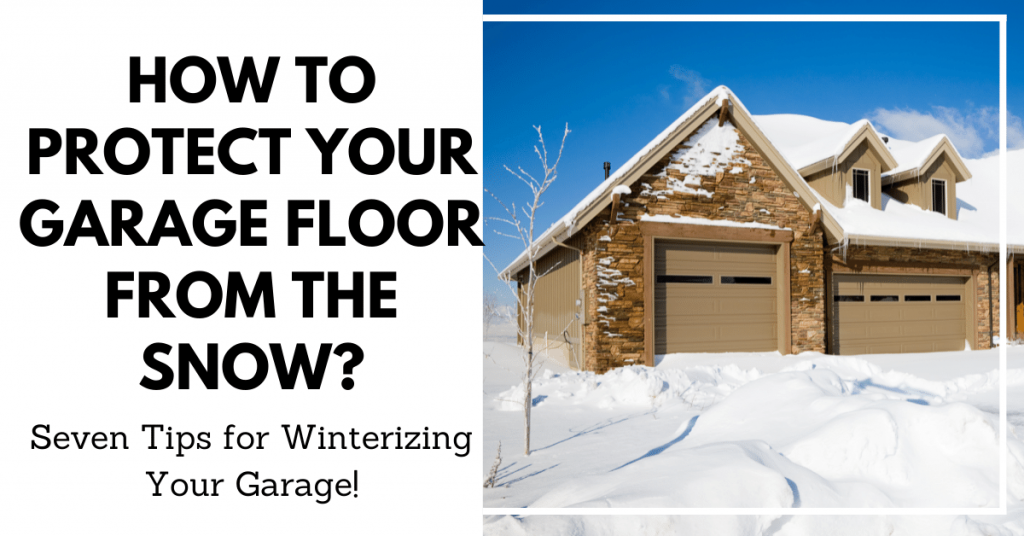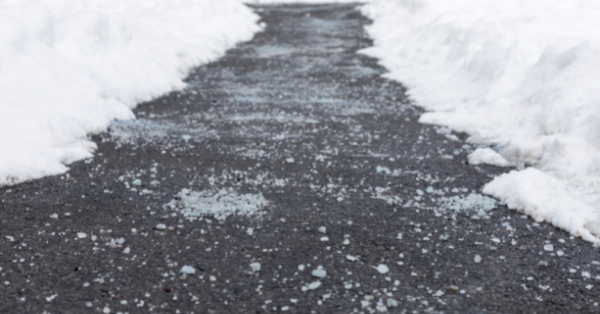When thinking about protecting your garage from snow, chances are you think about preventing the garage door from freezing shut or mold from growing in the walls.
While these are perfectly valid concerns, we often neglect the garage floor entirely.
And I get why, snow doesn’t seem like the most obvious threat to your garage floor, after all, what’s a little snow to a surface that’s driven on?
How Does Snow Damage Garage Floors?

However, snow can damage your garage floor in several ways.
Foundation Flooding.
When snow is allowed to accumulate in your garage and melt, it may flood your foundation, which can cause significant structural damage to your home.
In addition to being extremely expensive and difficult to fix, damage to your foundation also poses a significant risk to your safety.
Concrete Damage.
If you live in an area that experiences heavy snowfall annually, you know the damage snow causes to the roads and sidewalks, the same can happen to your garage floor.
When snow melts it enters the cracks in your concrete as water, however when the temperature becomes colder, that water expands as it freezes and becomes ice, worsening the cracks in your garage floor.
Not only does this make your garage less aesthetically pleasing, it also has the potential to damage your vehicle.
So how do we protect our garage floors from snow?
Shovel Snow Away from Your Home.
This is arguably the easiest step, when clearing the snow from your driveway, take care not to pile it near to your home.
Doing this makes sure that when the snow melts, it will not enter your garage.
Clean Your Car.
Another easy way to protect your garage floor is to brush the snow and ice off your car before parking it in your garage.
Check out this two-in-one snow brush and ice scraper at the link below.
[amazon box=”B08HVLCJQ3″]
Salt Your Driveway.

Salting your driveway helps to remove the snow from your car’s tires before you drive into your garage.
But be careful how much salt you use as too much can corrode your driveway and concrete floors over time.
PRO-TIP
Salting your driveway not only protects your garage floor from snow, but it also prevents you from slipping on ice.
Seal Your Garage Door.
Garage doors that aren’t flush against the floor when completely closed invite snow in.
If when your garage door is completely shut you can still see light from outside streaming in, it’s time to replace the seal.
Check out our favourite garage door seal at the link below.
[amazon box=”B089W77W25″]
PRO-TIP
Sealing your garage floor can also reduce your electricity and gas bills by improving your insulation.
Garage Mats.
Unless you keep your car outside in the winter, which, by the way, we don’t recommend, snow will find a way in when you inevitably open your garage door.
Garage mats are a great way to prevent the snow that enters from being able to settle on the floor.
If you can’t get your hands on garage mats, cardboard boxes are a great alternative as they absorb moisture and keep your garage floor relatively clean.
Invest in Equipment.
Snow may still find its way into your garage even if you follow the tips above.
But don’t despair, here are two ways to remove excess moisture from your garage.
Get a Blower Fan.
While ordinary fans may struggle, blower fans are a great way to completely dry out your garage regardless of the temperature outside.
Look at our favourite blower fan at the link below.
[amazon box=”B07RKLCG8X”]
Buy a Dehumidifier.
In more extreme cases, a dehumidifier may be used to remove moisture that the blower fan could not.
Additionally, by adjusting your garage’s humidity, a dehumidifier will help to prevent mold from forming in your walls.
Click the link below to see a great dehumidifier!
[amazon box=”B08HVLCJQ3″]
PRO-TIP
Buying this equipment is a great long-term investment but if you don’t want to commit just yet, renting is always an option.
Garage Maintenance.
A great way to prevent snow from worsening the cracks in your garage floor is to seal those cracks when you notice them.
Regular upkeep will prevent you from having to spend time and money on large scale renovations due to extensive damage in the future.
Conclusion.
So, there you have it, our best tips for winterizing your garage.
Let us know if you use any of these tips and thanks for reading!
